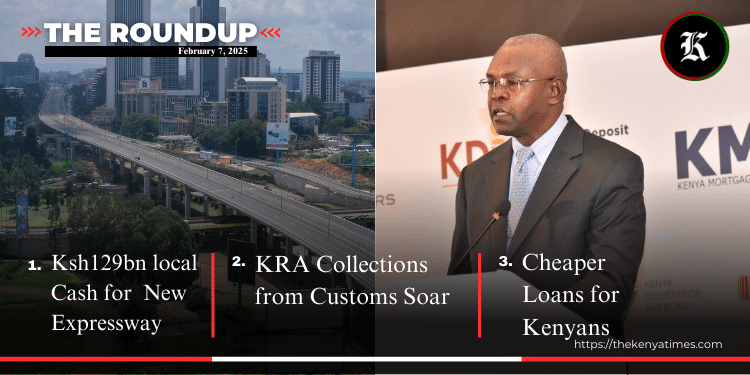Hello and welcome to today’s edition of The Business Roundup. In this edition, we bring you the latest updates on economic trends shaping Kenya’s business landscape, including Kenyans benefiting from cheaper loan interest rates after the Central Bank of Kenya (CBK) lowered the benchmark rates.
Meanwhile, the Kenya Revenue Authority (KRA) is seeing significant growth in taxes from imports and exports, contributing to the country’s fiscal health.
Plus, get an inside look at the ambitious Ksh129 billion funding needed to kickstart the Nairobi-Mombasa Expressway, a transformative project set to boost trade and reduce travel times across Kenya.
Subscribe today and stay updated on top news stories in The Kenya Times Business Roundup. The Roundup presents a compilation of business stories that hit headlines throughout the week.
Kenyans to Enjoy Cheaper Loans After CBK Cut Lending Rates
The Central Bank of Kenya (CBK) has lowered the interest rate by 50 basis points from 11.25% to 10.75%, citing the need to ensure that commercial banks pass on the benefits of the rate cut to consumers.
The move is part of CBK’s efforts to manage inflation and support economic growth.
In addition to the rate cut, CBK announced that it has begun on-site inspections of banks to verify that they are reducing their lending rates in line with the recent adjustment.

The apex bank said the financial institutions are expected to take the necessary steps to lower their lending rates further, to stimulate growth in credit to the private sector, and support economic activity.
Despite the substantial reduction in the Central Bank Rate (CBR) since the August 2024 Monetary Policy Committee (MPC) meeting, CBK noted that lending rates have only declined marginally.
The average lending rate by commercial banks rose by 0.3% in December 2024, dropping from 17.22% in November to 16.89%.
In December, 23 banks reduced their lending rates, while 14 raised them, and Equity Bank maintained its November rates.
CBK also announced the reduction of the Cash Reserve Ratio (CRR) by 100 basis points to 3.25 percent from 4.25 percent, to complement the lowering of the CBR, and support lowering of lending rates.
“The MPC noted that the reduction in the CRR will release additional liquidity to banks. This is expected to lower the cost of funds and lending rates, and support growth of credit to the private sector,” CBK said.
US Firm Eyes Ksh129bn local Cash for Expressway
Everstrong Capital (K) Ltd, a US-based infrastructure investment firm, is now seeking Ksh129 billion ($1 billion) to jumpstart the Ksh450 billion Usahihi Expressway project.
The 440-kilometer, four-lane dual carriageway will link Nairobi and Mombasa, aiming to reduce travel time from 8-10 hours to just 4 hours.
Named “Usahihi” – a Kiswahili term meaning “done correctly” – the expressway is expected to significantly boost trade, improve logistics, and spur economic growth along Kenya’s busiest transport corridor.
Everstrong Capital is leading fundraising efforts through a Transaction Advisory and Placement Services Agreement with CPF Capital and Advisory Ltd, a subsidiary of CPF Group.
The initiative is further supported by the Pack Hunters Club (PHC), a consortium of pension funds, fund managers, investment banks, insurance firms, and banking institutions.

KRA Records Historic Ksh 82 Billion in Customs Tax
The Kenya Revenue Authority (KRA) Customs taxes reached Ksh82.554 billion in January 2025, surpassing the taxman’s monthly target.
This marks the highest monthly collection in the history of the department.
The collection surpassed KRA’s target of Ksh74.44 billion by Ksh8.116 billion, reflecting a performance rate of 110.9%. The January revenue also represents a 27.0% growth compared to the same period last year.
KRA attributes its strong performance to ongoing reforms within the Customs division, including the establishment of the Centralised Release Operations.
Under this system, release officers are stationed at a centralised location, with customs declarations randomly allocated for release, leading to a more efficient and objective process.
Another key factor that contributed to the strong revenue performance was the growth in non-petroleum taxes of 11.6%, compared to January 2024.
Petroleum taxes also had a strong performance registering a growth 55.9% against the same period last year.
This growth in Petroleum taxes was largely driven by a 6.6% increase in overall oil volumes, with a significant growth in petrol (89.7%) and diesel (65.0%) resulting in above-target performance across various tax heads, including VAT oil, excise duty oils, and fuel levies (PDL, RML, PRL., and RDL).

ALSO BIG THIS WEEK
- M-Oriental Bank announced a reduction in its lending rates from 16.5% to 16.0%, effective March 1, 2025.
- The Kenya Electricity Generating Company (KenGen) PLC reported a 79% growth in profit after tax, reaching Ksh5.3 billion for the six months ending 31st December 2024, up from Ksh 2.95 billion in the same period in 2023.
- Treasury CS John Mbadi announced that the government will not increase Value Added Tax (VAT) and the Finance Bill for this year may not include any upward tax adjustments.
- The Energy and Petroleum Regulatory Authority (EPRA) and the Kenya Bureau of Standards (KEBS) finally cleared the air on concerns raised about the quality of petroleum fuels in the market.
- CBK Governor Kamau Thugge explained that Kenya’s Real Gross Domestic Product (GDP) growth projection for 2024 was downgraded due to a deceleration in growth across most sectors of the economy during the first three quarters of the year.
- Equity Bank, in partnership with the International Finance Corporation (IFC), launched a Ksh 2.5 billion Risk Sharing Facility (RSF) to promote financial inclusion in underserved regions, particularly among refugees and host communities across 44 counties.
- The government is considering options of listing Kenya Pipeline Company (KPC) on the Nairobi Stock Exchange (NSE) through an Initial Public Offering (IPO).











































































